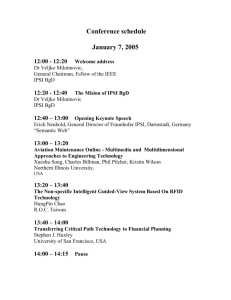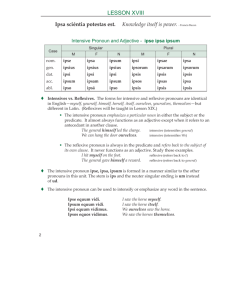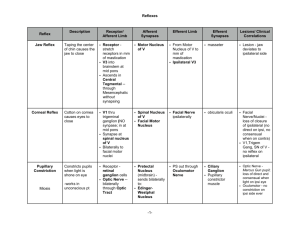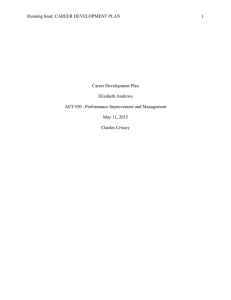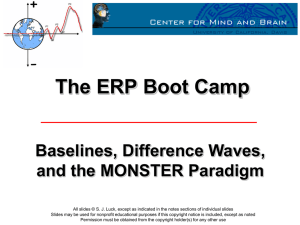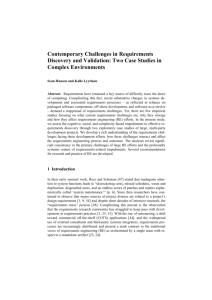International Peace & Security Institute Practicum
advertisement
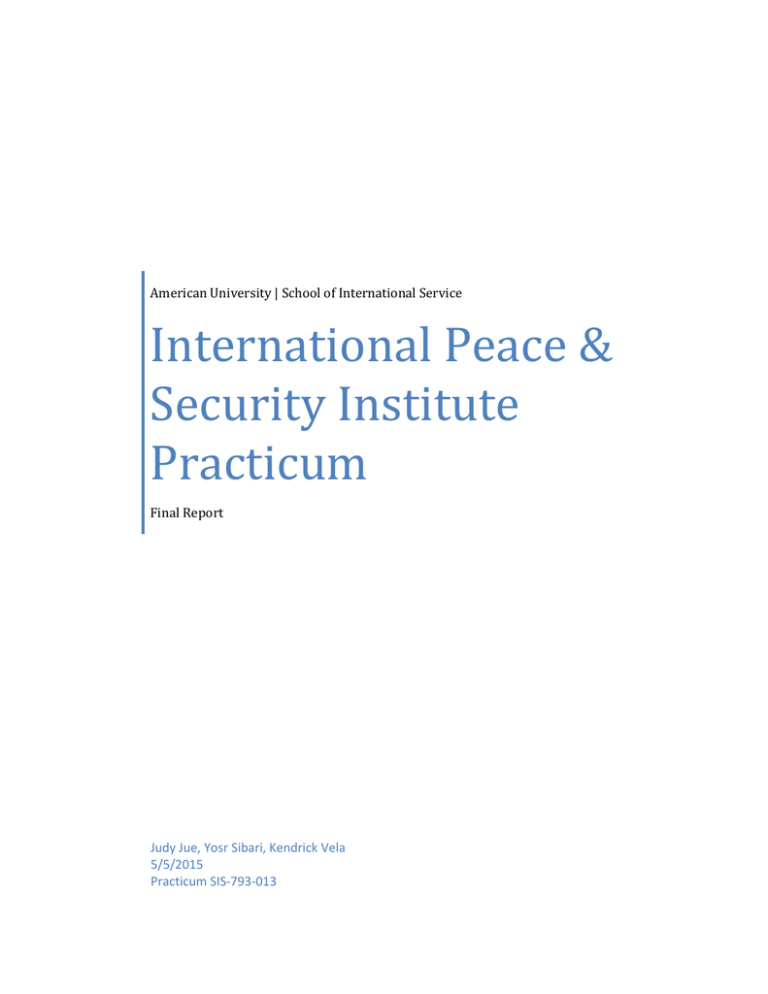
American University | School of International Service International Peace & Security Institute Practicum Final Report Judy Jue, Yosr Sibari, Kendrick Vela 5/5/2015 Practicum SIS-793-013 Table of Contents Executive Summary ........................................................................................................................ 3 Introduction and Context ................................................................................................................ 4 SWOT Analysis .............................................................................................................................. 5 Strengths ...................................................................................................................................... 5 Weaknesses ................................................................................................................................. 6 Opportunities ............................................................................................................................... 7 Threats ......................................................................................................................................... 8 Timelines......................................................................................................................................... 9 Critical Decisions .......................................................................................................................... 11 Recommendations ......................................................................................................................... 13 Operational Recommendations ................................................................................................. 13 Financial Recommendations ..................................................................................................... 14 Strategic Long-term Recommendations .................................................................................... 15 Appendices .................................................................................................................................... 16 SWOT Analysis......................................................................................................................... 16 Timelines ................................................................................................................................... 18 Figure 1.1 IPSI 6-Month Outlook.......................................................................................... 18 Figure 1.2 IPSI 12-Month Outlook........................................................................................ 18 Figure 1.3 IPSI 3-Year Outlook ............................................................................................ 18 Critical Decisions ...................................................................................................................... 19 Figure2.1 Hiring Decisions 19 Figure 2.2 Not-Hiring Options ............................................................................................. 20 2 Executive Summary The International Peace and Security Institute (IPSI) is an organization that was founded with a mission to change the world in a peaceful manner. In just a short time, IPSI has gained the international recognition within the peace building community that their efforts most definitely deserve. IPSI has shown through their exceptional performance and by being a pioneer in experiential learning in peace building that they are truly fulfilling their mission. Our group sought out to help this organization realize the areas of concern so that they can move forward. After completing a SWOT analysis, our group realized that the main strengths of IPSI are in their experience, international reputation, motivated staff, board of directors, strategic partnerships, and alumni network. Furthermore, the weaknesses of the organization are its lack of human capacity, financial experience, office structure, and a comprehensive budget. Finally, the threats that we analyzed that put IPSI at the biggest risk revolve around the organization’s short-term vision, lack of financial planning, and no central means of communication. However, being such a new organization, we did see a lot of opportunities to help IPSI move forward. These included utilizing their marketability of expertise, their networks, and their geographic location. We also believe that a great opportunity lies within the new D.C. symposium that IPSI plans to initiate. Recommendations: 1. Have a weekend long (2-3 day) staff team building and inclusive strategic planning a. Discuss future goals and plans for IPSI with board members, staff members and other key stakeholders b. Internal review of procedures and organizational support structure of IPSI c. What are strengths and weaknesses of the organization and what are the immediate steps staff and others can help address challenges? 2. Develop a comprehensive fiscal report and communicate it with staff and the board a. Includes current financial balance; cash flows; budgets of each program and project; expected financial trajectory b. Plan multi-year plan to address financial obligations 3. Expand on interns, fellows and bookkeeper duties in the short-term until decisions on which key hire(s) can be made 4. Assess current partnerships and stakeholders in IPSI a. What are some opportunities for new and renewed partnerships from pre-existing connections and relationships? b. How can IPSI strengthen its ties with DC and international peace building communities? 5. Explore novel, long-term opportunities and sectors IPSI can expand into a. How can IPSI better market products it has already developed? b. What about exploring accreditations for symposiums trainings? 3 Introduction and Context In American University’s Issues in Nonprofit Management practicum course, a group of three graduate students have teamed up with the International Peace & Security Institute (IPSI) to assist this young organization, going through a decisive turn in terms of sustainability and growth. The objective of this practicum project is to provide IPSI team with a thorough assessment of their operational management, identify the weaknesses, and come up with a set of recommendations to help it overcome the managerial and financial challenges that it faces as a nonprofit organization in today’s world. As IPSI begins to grow and emerge as a prominent global organization, the group aims at assisting its staff members in their efforts to foster financial stability, office structure and capabilities, and overall sustainable growth. Founded in 2009, IPSI had an entrepreneurial, ambitious start, with the mission to educate and train the next generation of peacemakers. With a small team of passionate, driven and enthusiastic individuals, IPSI has been able to train hundreds of peace building leaders from around the world. Although the organization has been able to do much in the past few years, the organization infrastructure has not kept up with the ambitious pace. While the start-up model has worked so far, establishing IPSI as a leading, credible pioneer in the field of experiential learning in peace building and security, the organization has reached a critical decision point. IPSI has proven to offer high quality programs and building a solid international name, image and reputation. Nevertheless, as the ambitious non-profit grows into a larger, more established organization, operating under that model proved to cause financial and operational challenges and constrain its growth. The practicum team believes that IPSI needs to establish strategic and structural changes to ensure a sustainable expansion. This report presents the team’s assessment and analysis of the organization’s needs, challenges, deficiencies and opportunities. Based on these findings, the team came up with a set of recommendations for IPSI to consider, aiming at addressing weaknesses, optimizing strengths and making the best of opportunities, building the organizational capacity necessary to accommodate larger projects and programs that can propel IPSI forward. Our mission was to assist IPSI by making sure that we are able to offer recommendations that can ultimately help the organization grow. Our recommendations focused on improving the symposiums and the logistics of the organization, major financial reforms, and adding new fundraising efforts. With all of the being said, if IPSI were to make such improvements to their structure, we believe that they will finally be able to reach their true potential. 4 SWOT Analysis Strengths IPSI enjoys an established international renown as a leader in experiential educational training in the field of peace building and security. Over the six years of its existence, the organization has accumulated invaluable experience in designing and delivering training curricula. It also succeeded in bringing in and engaging top practitioners and influential speakers for their workshops; conducting substantive training modules and simulations; and sharing hands-on, real-life experiences in peace building with their participants. In addition to summer symposiums in Bologna and Hague, IPSI has been able to develop a diverse range of products and services readily adapted and easily tailored to needs and demands of different clients, projects and programs. This helped the institute build solid strategic partnerships through working with a number of public and private sector clients, creating a diverse client base and alternative stream of revenue for the organization. Internal resources, in terms of human capital, constitute one of IPSI’s most important strengths. With a team of passionate, driven and enthusiastic staff members, the workload is flexibly divided in a strong sense of ownership and engagement. In addition, the small size of the core team, three people, and the lack of bureaucracy allows a fluid, quick decision making process, boosting efficiency and improving productivity. The team also benefits from the help of fellows, who provide logistical support to program directors and help implementing development strategies and marketing actions. Interns on the other hand work on the production of the weekly Peace and Security Report, which constitutes a valuable source in the sector and a high visibility tool that helps IPSI reach a large audience and promote its image. Interns also actively manage IPSI’s presence on social media and the administrative processing of symposiums’ applications. IPSI’s Board of Directors is a key strength for the organization. Composed of renowned figures of the peace and conflict resolution community, the board features members with a lot of expertise to offer in programmatic and organizational matters. The board is highly involved and engaged in expanding IPSI’s connections in the sector and is a strong asset to providing necessary support. Another important strength that the institute acquired throughout the past years is the continuously growing network of symposiums alumni. The alumni network constitutes a valuable resource that can help further expand the international IPSI “community”. Symposiums alumni can be potential mentors, donors, clients and advocates for IPSI’s mission and goals. 5 Weaknesses Similar to other young organizations with limited resources and large ambitions, IPSI’s human capacity and resources are stretched. Firstly, the IPSI staff is constrained by its small human capacity of three core staff members, who are overbooked by projects workload and responsibilities that cannot be delegated to fellows or interns. In addition to their respective demanding symposiums, which duties include: content building, outreach, budgeting, organizational and logistical work, the two program managers also work in parallel on business development, proposals bids, and contracted projects. They also work on the hiring process of fellows and interns, who require additional supervision for their work. This results in an overworked team, whose members are continuously working on “high-season” mode with almost no time-off. The CEO, who is also on the edge of a burnout, has a multitude of responsibilities and tasks that are hard to manage all at once, and in some cases, tasks he simply lacks expertise in, such as the strategic financial management. From an organizational standpoint, the lack of bureaucracy and overall administrative framework undermines the organization’s ability to handle larger workloads, which threatens the sustainability of its multiple activities. The organization does not have any kind of operations/personnel manual that specifies its operational policies, indicating a lack of structural planning for long-term growth and expansion. While the fluidity of job responsibilities lessens bureaucratic red tapes that hinder rapid response and decision-making, the lack of defined job obligations can lead to confusion in communication, overlapping responsibilities and missed opportunities. This can also bring in unnecessary tensions among the team members, resulting from the lack of clarity in the scope of their responsibilities, duties, rights and benefits. The financial issues represent the biggest, most risky and most urgent weakness for IPSI. With the team’s lack of financial training and experience, the organization is short of strategic longterm, financial management and budgeting. Bookkeeping is not in-house and is dependent on external accountant to occasionally and routinely edit the books. Throughout the period of the project, the practicum team was struggling to make the needed assessment of IPSI’s performance due to the absence of budgets, financial documentation and of any previous audits. The lack of a comprehensive financial status prevents clear strategic planning that the organization requires. With such weaknesses in its financial management and absence of an in-depth, strategic financial vision, IPSI is naturally struggling with debt. With a recent serious financial crisis and a current in debt of over $200,000, the organization continues to be in a state of financial anxiety. Uncertain financial stability prevents the organization from investing in key hires necessary to boost productivity and reduce the staff workload. The ongoing financial constraints prevent any potential pay increases and benefits, subjects the organization to continuous need and dependency on constant stream of new projects. 6 Opportunities At the beginning of our introduction to IPSI, it was clear that the organization carries an immense level of untapped potential. Through the board of directors and the staff, IPSI is truly capable of instituting some unprecedented change throughout the peace building community. It is imperative that IPSI thrives to make these opportunities flourish in order to reap the full benefits of this great cause. To begin, IPSI has the marketability of expertise to its benefit. Known globally for itsimpeccable programming, IPSI would benefit greatly from marketing this expertise. Every great organization needs to have a reputation and skill to be marketed to potential donors, clients, and participants in their programs. By instituting the symposiums in Bologna and The Hague, IPSI has catapulted itself into a globally recognized icon of peace building. The next step would be to utilize this marketing tool as best as possible. The best way to do this would be by possibly reaching out to donors that have been influenced or have heard of the influence of IPSI. When donors see that they have a reliable organization that is doing great things in the peace building world then they would be likely to donate to the cause. Consistent donors would provide much needed additional financial support. By continuing to fulfill the mission and growing as an organization, satisfied donors will donate for years to come and create an environment for a consistent stream of revenue. This would also attract other global investments from foreign governments and nationals interested in developing or utilizing IPSI services. IPSI has the unique trait of being at the top of expertise when it comes to the experiential learning market and should be leveraged to open more opportunities for IPSI. The next step would be to expand the networks even further. The best way for IPSI to expand the network is by increasing partnerships to reach the public, private, and nonprofit sectors. All three sectors can benefit tremendously from by the work of IPSI and, as stated earlier, this would allow for long-term contract opportunities that will help alleviate some of the financial struggles of most young nonprofit organizations. It is important to understand that there is a growing interest in the United States and around the world for increasing cross-cultural competence and developing a globally-minded workforce and IPSI can contribute by increasing such crosscultural competencies. With the success of the symposiums in Bologna and The Hague, we definitely see the opportunity that arises from expanding to add more symposiums. Adding the Symposium in Washington, D.C. offers a wide array of opportunities that include providing experiential programming to a domestic audience. As discussed earlier, IPSI has name recognition throughout the world; however, it is time to bring that recognition to the United States as well. Establishing a presence in D.C. would allow for more networking and branding that comes with being in such a global city. Being in the nation’s capital allows for more access to international organizations, embassies and foreign governments, and international corporations based in D.C. while not having to be hindered by the expenses of travel. 7 Threats In this section, our group discusses the possible threats that we have identified through our analysis of IPSI. First, the organization mainly focuses on a short-term vision, with a lack of a long-term planning. As the key to a great organization is longevity, long-term goals and planning need to be a priority for IPSI’s staff. With the current struggle of financial survival, IPSI is in a situation where the staff is engaged in too many projects at one time to be able to fully put their efforts into each project, risking quality drop and staff exhaustion. Sustained pressure to take on more projects would only increase this exhaustion. An exhausted staff makes for an inefficient organization. Employers should strive for their employees to have scheduled vacation period. This period would allow the staff to recharge and revitalize their efforts and would help the organization in the long run. In analyzing the upcoming time frame and projects for IPSI, it is evident that the office will have a lot to work on in the months to come. There currently is not a proper time frame to develop new materials, modules, and overall marketing for the D.C. Symposium, which will take place in January 2016. Because of the busy schedule in the summer working on the other two symposiums, IPSI would not be able to fully concentrate on the D.C. Symposium until August. Giving full effort in August only gives a little over four months to prepare an entirely new symposium. This may be too little time to develop the quality of materials that has given IPSI its global recognition, and to conduct sufficient marketing actions. Symposium is expected to be marketing IPSI products to domestic audience but if not well done, the D.C. symposium may jeopardize the organization’s reputation. Upcoming projects, such as the Institute for Inclusive Security and Digital House of Wisdom, will cover April and May while Bologna and The Hague Symposiums would dominate June and July, only further complicating the schedule. Furthermore, there needs to be a stronger emphasis on fiscal and organization administration and management. The current structure of planning has resulted in overlapping projects and potentially reducing the quality of products produced. This is also an inefficient allocation of human resources that could be used elsewhere and cause an inability to make calculated decisions on investing into long-term projects. Without a coherent, cohesive vision, the organization risks misallocating already limited resources, further stressing the fragile system. Finally, as IPSI continues to grow, it is evident that the lack of bureaucracy within the organization can only be maintained as long as each and every staff member understands the scope and extent of their duties and have proper channels of communication and delegation of responsibilities. The organization lacks central means of communication between board members, staff members, and outside individuals. The risk in communication lapses impedes on internal management and communication but more importantly, risks miscommunication between important stakeholders and potential opportunities. 8 Timelines Despite the small size of the team, IPSI produces programs and materials of high caliber, competitive against much larger organizations. To better understand the workload of the team, the 3 timelines below lay out the expected time commitment and projects the team has committed to in the next 6 months, 12 months and in the next 3 years. The yellow bars indicate minimal to partial of daily time and effort dedicated exclusively to preparing and working on each project. Red bars indicate significant time and execution of the projects. Lastly, green bars indicate completion and evaluation paperwork and activities that conclude each project. Projects that do not have green bars following red bars refer to projects that are assumed to not require evaluative analysis. By comparing immediate outlooks to a larger overlook, we can see a natural pattern of busy and slow seasons in IPSI and select future projects that are more compatible to their symposium time commitments. Firstly, in IPSI’s immediate six months, much of the teams’ efforts are dedicated to preparing the final logistics and materials for summer symposiums in Bologna and Hague. As we see in Figure 1.1, there are significant bars of yellow and red, which significantly reduces the team’s ability to take on new contracts or development efforts. This is to be expected as symposiums are IPSI’s core programs that bring in consistent revenue to the organization and will continue to do so in the future. However, for this upcoming summer, there is an overlap between the two European symposiums. In addition to simultaneous symposiums, there are projects due just prior and immediately after the symposiums such as the Rotary Club video due May/June and the Trauma Project, headed by Andres Martinez, which is expected to be completed by September. Aside from projects flanking the symposiums, IPSI hopes to complete its first formal audit in October of this year, which requires the staff to prepare documentation and structures that would facilitate the process. We can expect period of intensive organizational restructuring and re-examined policies shortly after summer symposiums, which leaves little to no room for the IPSI to fully rejuvenate before launching into the structural changes that will be decided upon, established and implemented in the coming fall. Following an intensive summer and early fall season, the trajectory of the next twelve months seems much more relaxed, with the development of materials and marketing of the D.C. symposium in January 2016. While the quiet last quarter of 2015 may provide the staff much needed rest, this time would be optimal time to implement financial and organizational reforms and changes that will better support sustainable growth. Due to the unpredictable nature of contracts and short-term projects, the fall may also include unexpected new projects and deadlines not accounted in Figure 1.2. Despite, unforeseeable projects, we can expect a shift in focus from programming to internal organizational development in the last quarter of 2015. Lastly, Figure 1.3 provides a long-term view of IPSI’s commitments over a three year period from 2015-2017. While this is not a comprehensive outlook, the timelines shows that IPSI should prioritize symposium marketing and curriculum development in the first half of each year and contracts and smaller projects in the latter half of the year. While preparation for the DC symposium should be a priority in the latter half of the year, it assumed that much of curriculum for the DC symposium would have already been developed, and for either the Bologna or Hague symposiums that preparation for the DC symposium would primarily be in marketing. Aside 9 from symposium priorities, other contracts and partnerships should be prioritized in the second half of each year. While deadlines and agreements may greatly vary, IPSI should avoid accepting large projects and commitments that largely overlap in the symposium intensive 6 month period of March through September. Overall, the timelines are to provide a rudimentary overview of IPSI’s commitments and deadlines, but the team may find it more useful to expand these timelines to include a quarterly view. If possible, specific dates of smaller deadlines within each project should also be included. The bars indicate time and intensity each project would require to complete but do not indicate when payment for services would be received by IPSI given the different payment forms for the various projects and contracts IPSI engages in. Further inclusion of payment information in timelines would be helpful for staff to better determine how much effort should be dedicated to each project. As the organization continues to expand, it may also be informative to include the individual(s) responsible for each project and their duties in the different phases of throughout the process, to promote accountability and delegation of project responsibilities as to not overburden a single individual. 10 Critical Decisions As IPSI matures through engaging in more partnerships, contracts and developing a new symposium, the staff of IPSI needs to also reflect the growth of the organization. From previous timelines, the organization has continued to obtain several new projects and contracts each quarter, which has continued to challenge the capacity of the small staff. While the motivated staff has continually raised and exceeded expectations to the multi-tasking multiple projects, it is uncertain how much longer the staff will be able to do so. To alleviate the multiple responsibilities of each staff member, the organization should consider hiring an additional staff member to address the core operational duties that each staff currently oversees. In Figure 2.1, there are four positions that address the most pressing needs of IPSI: Development Manager, Chief Financial Officer, Program Manager, and Grants Coordinator positions. Given the organization’s lack of development strategy, a development manager that could identify relevant funding opportunities is of critical importance to IPSI. Such manager would develop a comprehensive strategy incorporating the current fundraising and development efforts led by fellows and interns. A permanent staff member could greatly improve the capacity of marketing, promotion and development campaigns, bolstering funds to pay down on debt or invest in upcoming programs. An investment of a development manager may increase the donations and additional revenue that could help IPSI reduce its current debt and address the lack of development for the organization, cushioning the organization from financial uncertainty. Another position that is needed in IPSI’s core staff is a chief financial officer who could exclusively manage the financial duties that the CEO currently oversees. The CFO can provide the additional operational support for the organization by establishing a clear financial vision and plan for IPSI, which currently has not been established nor articulated. While the financial duties may not be substantial enough to hire an additional staff member, the current workload is exclusively managed by the CEO, severely limiting his ability to explore opportunities and ventures. With a single individual dedicated to managing financial aspects of IPSI, other staff members will have more time to focus on their programmatic foci and exploring new business opportunities, which would be more beneficial to long-term growth. With a new symposium to be launched in early 2016, IPSI may need to look into an additional program manager that can develop more materials and products so that the current two program managers would not have to divide their energies between their own programs, projects and the new symposium. In the long-run, an experienced program manager may also fulfill additional support for several projects and contracts, boosting organizational capacity. Although additional time may be needed to train a new program manager, the significant lack of human capacity limits IPSI’s ability to compete for larger and more projects and produce materials in the quality the organization is known for. More importantly, an additional coordinator could provide administrative support, allowing the program coordinators to focus on curriculum development and programmatic related issues rather than managing operational duties as well. In addition to other positions that expand the capacity of the staff, a grants coordinator would support the current structure of IPSI by monitoring opening of projects and managing the increased paperwork and logistics that come with additional contracts and grants. With one 11 centralized point of contact between the IPSI office; it is the duty for the grants coordinator to research grants and other business opportunities and follow through with current contracts to ensure payment and provide a consistent voice of the organization. Assuming that IPSI staff can continue to take on more projects, without reducing the quality of their concurrent commitments, the grants coordinator will serve as operation support. However, should IPSI be financially constrained from hiring, not hiring is a consideration for the short term. Should the current staff not be expanded, the roles and duties of some individuals need to be broadened. IPSI has two fellows per academic year and six interns per semester, whose responsibilities can be expanded to address the lack of development, programmatic support and general external coordination. For the two fellows that dedicate their time handling the logistics of each of the symposiums, their roles may be expanded to include financial management of each program and contribution to the aggregate, overall IPSI budget. If possible, fellows and interns could also contribute by providing the programmatic support of each symposium, in addition to current duties of developing marketing strategies and contributing to the newsletter. In addition to increasing responsibilities of current staff, IPSI could increase bookkeeper services to include developing broader financial plans and more comprehensive budgets such as organization-wide cash flows, profit-loss sheets and full organization budget. Increased bookkeeper services may provide more clarity to the financial state of IPSI and a better foundation in which the Board of Director’s Finance Committee can better craft a feasible financial plan. 12 Recommendations Operational Recommendations As IPSI continues to grow and mature, the capacity of the organization needs to reflect growth either through hiring additional staff or bolster the duties and responsibilities of interns and fellows. The hiring decision tree highlights four positions, development manager, chief financial officer, program manager and grants coordinator positions that address the core needs of development, financial support, program support and operational support. Our recommendations would be to hire in the order of development manager, chief financial officer, program manager and grant coordinator. Development and fundraising remains a key area that IPSI does not have the time to address, but it is a large opportunity that the organization can address with a development manager, supported by fellows and interns. A chief financial officer would provide much needed financial support within IPSI and help the organization have the proper paperwork. An additional program coordinator could increase the overall programmatic capacity of IPSI and provide general support for the staff. Lastly, a grants coordinator could manage the influx of projects and contracts, providing general staff support and quality assurance of work. Given the busy summer, it is recommended that key hiring will not take place until August at the earliest. In the short-term, it would be conducive to expand the duties of the interns and fellows, to marginally reduce the workload of the core staff. It may be more strategic to expand the duties of the bookkeeper, interns and fellows for a few months to a year or two, until there are sufficient support and funds for a key hire. However, without sufficient financial information, we cannot recommend which position would be more strategic, more necessary or even possible in the short-term and long-term periods and the long-term value of hiring each position. On the operational standpoint, we highly recommend the creation of an Operations/Personnel Manual that will detail the scope of work and the staff job descriptions. For a more efficient, time-effective process, we recommend the use of any of the already existing templates of similar organizations and personalize it for the organizational profile and needs of IPSI. We suggest the manual includes a delineation of staff responsibilities between projects and an expansion of interns and fellows’ responsibilities. 13 Financial Recommendations The first set of recommendations we suggest are directly related to the financial and operational management. We believe that it is imperative for IPSI to immediately start working on having comprehensive financial and organizational overviews and communicating them to the board. This includes keeping a regularly updated full budget, producing consistent, monthly profit/loss reports and fund based cash flows, and sharing this information with the staff as well as the board. To have a comprehensive financial picture and a clearer idea about the costs of each project, we suggest using of accrual accounting instead of just cash based accounting and including the percentages of distribution/allocation of salaries to different projects. The availability and accuracy of such documentation is crucial to any efforts of fundraising and business development. Potential donors and partners require these documents to have an in-depth visibility of the activities and management of the organization, to be able to make informed decisions about the placement of their funding. Activating the role of the board’s finance committee should be of great help to assist in achieving these targets. Aware of the current tight financial standing of IPSI, we realize that generating revenue is its key, most urgent priority. We suggest exploring the possibility of increasing the symposiums fees, which should be preceded by a careful market study. We also recommend doubling the outreach efforts to attract larger numbers of participants. As noted in our decision trees, it may be time to invest an individual to exclusively prioritize fundraising and finding new avenues of revenue for the organization in the form of a development manager. Given constrained resources, it may very well that fellows and interns would work on these development aspects for the organization until someone could be hired. We recommend that fundraising be made a priority for the organization, even briefly for each year as to diversify the streams of revenue. We also suggest exploring ways to cut on logistical and organizational costs (i.e. flights, lodging…) during symposiums and throughout the year to minimize spending. However, there is potential in having competitively priced symposiums and workshops held locally in Washington D.C. In short, we would recommend fiscal conservatism for the next 6-months until more robust financial plan is developed. Without comprehensive financial overview of the organization, we were limited in our financial recommendations, aside from encouraging development and fiscal conservatism. This underscores the need for a comprehensive fiscal overview that aggregates the various program and activity budgets and overhead spending. A holistic financial assessment of the IPSI organization needs to be conducted and more regular budget information must be synthesized for the staff and board as that information should be communicated and accessible should there be a need. We would recommend that the staff start to aggregate financially related documents and the like, in a centralized location so that documents would be readily accessible. In addition to aggregating documents, we would recommend the staff conduct brief quarterly financial reviews to assess the spending of their respective programs and whether it aligns with greater financial goals and obligations. While many of these practices may be established and implemented in conjunction of the audit in October, it is more important that consistent financial reviews become routine and contribute to IPSI’s greater growth and sustainability plans. 14 Strategic Long-term Recommendations While we suggested many short-term recommendations to maintain operations at IPSI, we also have strategic long-term recommendations. These include hiring according to the results of the decision trees as well as long-term planning regarding finances, programs, and business development. The hiring and the decision tree that we created allow IPSI to look at the possible scenarios of adding a new member to the staff. Because of the growth of IPSI in regards to its projects as well as an organization, it will be imperative in the future to hire more staff members. However, because of financial constraints, this may be difficult. Due to the lack of information regarding the internal budgetary restrictions, this model is merely a template to be used by IPSI. Using this system, IPSI should be able to make a knowledgeable decision of what it would do to the organization to build the staffing needed to accommodate the growth. In order to decide on the hiring and to be able to use the decision tree, we recommend that the fixing of the finances be a priority for IPSI. Organizations cannot function properly and to their full potential if the overall finances are not in place. This recommendation when it comes to looking at who IPSI should hire next in their office. While they do have a bookkeeper to assist in the finances, being such a young organization, it may benefit them more if they have someone in the office that is constantly making sure that the finances are in order. Programming is a major component of IPSI. This organization was grounding by its programming. The programs of IPSI are what give the organization its great reputation. However, because of the finances, these programs need to be instituting as efficiently as possible. Our biggest concern regarding programming is the D.C. Symposium that is set to occur in early 2016. As stated previously, the organization must take a significant amount of time preparing for this symposium because there is a lot at stake when instituting a new program in D.C. Finally, we found that these issues can be fixed with more efficient long-term business planning, which the staff and organization as a whole could address if there was a set time to thoroughly assess the state of IPSI. This process could be conducted over a weekend or even a day, but there must be cohesive consensus on the vision and direction of IPSI’s growth that is articulated to the board, the staff and other major stakeholders. IPSI has been amazing with their programs and now it is time to extend that greatness through a well-versed business model. If there is a system in place, such as a business plan, that can help put this all in motion. IPSI will be on its way by being domestically and internationally renowned organization that is known for overall success. 15 Appendices SWOT Analysis Strengths ● Experience: ○ Strong international reputation as leaders of experiential learning through symposiums ○ Have been able to leverage expertise to contracts and supplemental projects ○ Diverse range of products and services developed and readily adapted to needs and demands of different projects and programs ● Motivated Staff: ○ Flexible core staff dividing the work load ○ Lack of structural bureaucracy allows for team to make quick decisions ○ Fellows provide logistical support to program directors, development strategies and marketing ○ Interns supplement strategies and work of fellows and staff, searching for new opportunities and places for additional development ● Board of Directors: ○ Renewed engagement with the Board of Directors and peace-building community in DC and around the world ○ Involved board members to connect organizations and provide support ● Strategic Partnerships: ○ Experience with working with public and private sector clients, creating a diverse client base ○ Growing networks of symposiums alumni, further expanding on professional networks and additional potential donors, clients and advocates Weaknesses ● Human Capacity: ○ Core staff are overbooked by projects workload that cannot be delegated to fellows or interns ○ Lack of core staff to provide additional assistance to the team as to provide staff some time off ○ Hiring dependent on meeting immediate needs and goals ● Lack of Financial Experience: ○ Lack of strategic long-term, financial management and budgeting ○ Bookkeeping is not in-house and dependent on external accountant to occasionally, but routinely edit the books ○ No audit available ● Lack of office structure: ○ Lack of structural organization and personnel manual indicate little structural planning for longterm growth and expansion ○ Lack of defined job descriptions: each staff member has multiple projects and programs to attend to but responsibilities are not always clearly defined ● Financial Debt: ○ Continued state of financial anxiety from recouping from previous losses ○ Inability to reduce workload ○ Inability to provide pay increases or hire new staff due to financial constraints: ○ Continuously dependent on constant stream of new projects ○ Assumption that the products and services are marketable and popular in the long-run Opportunities ● Marketability of Expertise: ○ International reputation has increased interest in Bologna and Hague symposiums, improving consistent stream of revenue ○ Attracting global investments from foreign governments and nationals interested developing or utilizing IPSI services ○ No comparable competitor currently exist in experiential learning market/niche market ○ Benefiting from the expertise of former director of USIP Academy as a board member ● Expanded Networks: ○ Long-term contract based training opportunities, increasing public-private-nonprofit partnerships ○ Expansion of staff and partnerships with other organizations, domestic and abroad ○ Growing interest in the US and around the world in increasing cross-cultural competence and developing a globally-minded workforce ● DC Symposium: ○ Provide experiential programming to domestic audience and organizations ○ Establish presence and branding in DC area ● Location in DC provides opportunities for staff to network with: ○ International organizations ○ Embassies/foreign governments ○ International corporations Threats ● Too Short-Term Driven: ○ Engaged in too many projects simultaneously, overextending staff ■ Staff risk “burning out” from sustained pressure to take on more projects ■ Little to no scheduled vacation time ○ Tight time frame to develop new materials and modules for DC Symposium in January 2016 ■ Will not expect to start on development until August, which may be too little time to develop substantial new materials ■ Symposium is expected to be marketing IPSI products to domestic audience but if not well done, the symposium may jeopardize the organization’s reputation ○ Institute for Inclusive Security and Digital House of Wisdom projects will cover April and May while Bologna and Hague symposiums would dominate June and July, leaving little room for staff to rest before starting development for DC Symposium ● Lack of financial planning: ○ Results in overlapping projects and potentially reducing quality of products produced ○ Inefficient allocation of human resources ○ Inability to make calculated decisions on investing into long-term projects ● No central means of communication: ○ Lack of coordination between team, resulting in potential lapse of communication Hague Symposium: July 4 – July 25, 2015 (3 weeks), Bologna Symposium: June 27 – July 25, 2015 (4 weeks) 17 Timelines Figure 1.1 IPSI 6-Month Outlook Figure 1.2 IPSI 12-Month Outlook Figure 1.3 IPSI 3-Year Outlook Critical Decisions Figure2.1 Hiring Decisions Figure 2.2 Not-Hiring Options 20
